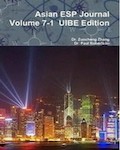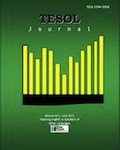skipper
skipper's Latest Posts

Coping with Cultural Obstacles to Speaking English in the Korean Secondary School Context
The Korean Ministry of Education has given priority to communicative competence in this current 7th curriculum, a major shift from previous curriculum methodologies. But the Korean English teachers have expressed their skepticism about the efficiency compared with the amount of time and money being put in, citing various reasons such as large class size, different levels of students’ spoken English, and teachers’ poor spoken English

Crossing the Frontier: An Investigation Into the Effects of Explicit Cross-Linguistic Awareness-Raising on the Subsequent L2 Written Performance of Japanese Learners
Several decades of research have indicated that the relationship between a learner‟s mother tongue (L1) and second language (L2) is a significant one. This study examined the effects of cross-linguistic comparisons and contrasts between learners‟ L1 (Japanese) and L2 (English) on subsequent L2 written performance. Two linguistic features thought to be problematic for Japanese learners were the focus of these comparisons and contrasts: articles and plural suffixes.

Reading Literature in English: Challenges Facing Omani College Students
Reading is a complex process. It involves interaction between reader and text characteristics, which work on each other to form meaning. Given such diverse factors as linguistic ability, cultural knowledge, attitude and motivation, reading in a second or foreign language is markedly more challenging than L1 reading. For learners in a society known for its orality and lack of a reading culture, reading in a foreign language might be a truly formidable task.

Ethnographic Conversations: A Pedagogical Strategy to Promote Language, Content, and Intercultural Learning among Japanese and American University Students
Two sociologists and an Applied English professor developed an educational activity, coined ethnographic conversations, as a collaborative pedagogical strategy to enhance language, content, and intercultural leaning. Japanese and American undergraduate students, matched as partners, scheduled four out-of-class meetings during which they discussed topics under study in their respective sociology courses.

Students’ Reactions to School Based Oral Assessment: Bridging the Gap in Malaysia
In 2002, the Malaysian School Based Oral English Test (SBOET) was implemented and this was viewed as an initial step towards formative language assessment in the ESL classroom. Since then, it has undergone several transformative changes. To date, there is scant empirical research that has looked at the SBOET from the perspective of the test takers. This paper presents the findings of a study that examined feedback from 2,684 upper secondary ESL students from 45 schools located in 10 states in Malaysia. This descriptive study employed both qualitative and quantitative methods of analysis.

English only? inda kali eh! (not likely!) Changing the paradigm
We live in an era of accelerated change and innovation which demands that we adapt and evolve or risk obsolescence and exclusion. This paper traces the path of English language teaching (ELT) since its inception. It examines some of the underlying theories that have guided its policies and practices at classroom level. It also questions whether ELT has kept pace with linguistic and other developments on a wider societal scale.

Shattering the hierarchical education system: The creation of a poststructural feminist English classroom
The study aims to examine the effectiveness of the poststructural feminist pedagogical model developed by the author in 2006 and apply the model to the English classroom to investigate whether it has any potential to increase Taiwanese students’ English learning achievement, critical thinking ability, and satisfaction with their class. The quantitative methods used in the study are an English achievement test, a critical thinking ability test, and a student satisfaction questionnaire. The qualitative methods are a semi-structured questionnaires and interviews. An independent sample t-test was used to determine if there were any statistically significant differences in the means between the students in the traditional classroom and the students in the poststructural feminist classroom.

Input Enhancement, Noticing, and Incidental Vocabulary Acquisition
This study investigated the effect of input enhancement on vocabulary acquisition from reading at 98% known-word coverage. 47 intermediate EFL learners from 11 language backgrounds read a level-appropriate English story containing 12 nonwords under one of two conditions—with or without textual enhancement of the target words. The participants were tested on word noticing, word meaning recognition, and word meaning recall. Both groups showed large gains on all the tests: The enhanced reading group scored 58% correct on noticing, 43% correct on meaning recognition, and 24% correct on meaning recall, whereas the unenhanced reading group scored 65% correct on noticing, 39% correct on meaning recognition, and 25% correct on meaning recall.










